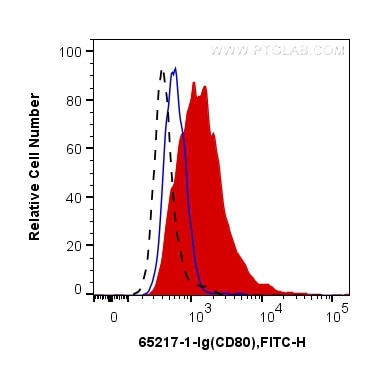CD80 Monoklonaler Antikörper
CD80 Monoklonal Antikörper für FC
Wirt / Isotyp
Maus / IgG1, kappa
Getestete Reaktivität
Ratte
Anwendung
FC
Konjugation
Unkonjugiert
CloneNo.
3H5
Kat-Nr. : 65217-1-Ig
Synonyme
Geprüfte Anwendungen
| Erfolgreiche Detektion in FC | LPS-stimulated Wistar rat splenocytes |
Empfohlene Verdünnung
| Anwendung | Verdünnung |
|---|---|
| This reagent has been tested for flow cytometric analysis. It is recommended that this reagent should be titrated in each testing system to obtain optimal results. | |
| Sample-dependent, check data in validation data gallery | |
Produktinformation
65217-1-Ig bindet in FC CD80 und zeigt Reaktivität mit Ratten
| Getestete Reaktivität | Ratte |
| Wirt / Isotyp | Maus / IgG1, kappa |
| Klonalität | Monoklonal |
| Typ | Antikörper |
| Immunogen | HTLV-1-transformed Lewis-S1 rat T cell line |
| Vollständiger Name | Cd80 molecule |
| Berechnetes Molekulargewicht | 36 kDa |
| GenBank-Zugangsnummer | XM_017597885 |
| Gene symbol | CD80 |
| Gene ID (NCBI) | 25408 |
| Konjugation | Unkonjugiert |
| Form | Liquid |
| Reinigungsmethode | Protein-G-Reinigung |
| Lagerungspuffer | PBS with 0.09% sodium azide |
| Lagerungsbedingungen | Store at 2-8°C. Stable for one year after shipment. |
Hintergrundinformationen
CD80 (also known as B7-1) is a type I membrane protein that is a member of the immunoglobulin superfamily, with an extracellular immunoglobulin constant-like domain and a variable-like domain required for receptor binding. It is expressed on antigen-presenting cells (APCs), including B cells, dendritic cells, monocytes, and macrophages. CD80 is the receptor for the proteins CD28 and CTLA-4 found on the surface of T-cells. It is involved in the costimulatory signal essential for T-lymphocyte activation. T-cell proliferation and cytokine production is induced by the binding of CD28, binding to CTLA-4 has opposite effects and inhibits T-cell activation. CD80 also acts as a cellular attachment receptor for adenovirus subgroup B. (PMID: 7545666; 12015893; 16920215)
Protokolle
| PRODUKTSPEZIFISCHE PROTOKOLLE | |
|---|---|
| FC protocol for CD80 antibody 65217-1-Ig | Download protocol |
| STANDARD-PROTOKOLLE | |
|---|---|
| Klicken Sie hier, um unsere Standardprotokolle anzuzeigen |


